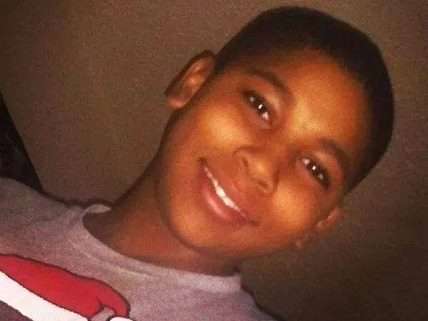High-Profile Police Killings Left Out of FBI Stats
Eric Garner's death (nor any from New York) not among homicide stats.


Eric Garner and Tamir Rice are household names now. Both were killed by police in controversial circumstances. But neither of their deaths will show up in FBI stats on justified police homicides because police participation is completely voluntary, and the law enforcement agencies involved are not providing the data.
I noted back around the time Garner was killed that his death wouldn't be logged by the FBI, as no law enforcement agency in the state of New York reports its police homicides to the feds. The Guardian, which has started its own database of police killings in the United States, notes that only 224 of the more than 18,000 law enforcement agencies reported any fatal shootings by police to the FBI last year. Granted, not every law enforcement agency is going to have anything to report, but this is some serious undercounting. The Guardian bulletpoints some analysis for last year's figures:
• No police departments from the state of Florida reported any homicides by officers, meaning deaths caused by police in the country's third-most populous state were not logged by the FBI. The New York police department, by far the country's biggest, submitted data for just one year during the past decade.
• Details of other controversial deaths that prompted protests were entered incorrectly in the FBI database, damaging government efforts to monitor demographic information about people killed by police.
• An increase in the number of homicides by police publicly reported by the FBI over the past five years was effectively matched by a rise in the number of individual departments reporting any homicides, casting doubt over purported trends in the data.
• The FBI records only basic personal details of each person killed and not information such as whether they were armed with a weapon – a critical factor in ongoing debates over the use of force by police around the country.
• A chaotic approach was applied to recording other high-profile deaths over recent years. Some were logged, some filed to a separate category with general homicides without noting the subjects were killed by police, and others were ignored.
The Guardian notes that some states—like Florida—do keep their own police homicide numbers, but provide essentially no data but the number itself (60 deaths for 2014). And when police homicides are ruled unjustified, they may end up in the general violent crime statistics. So presumably Samuel Dubose, shot and killed by University of Cincinnati Police Officer Ray Tensing, in July will be categorized as a murder in 2015's stats, given the charges against Tensing. Garner will not because there was no indictment in his death. For Rice, it will depend on whether a grand jury agrees with reports that a police officer shooting a 12-year-old on sight with absolutely no warning is "reasonable."
Read more here.
Editor's Note: As of February 29, 2024, commenting privileges on reason.com posts are limited to Reason Plus subscribers. Past commenters are grandfathered in for a temporary period. Subscribe here to preserve your ability to comment. Your Reason Plus subscription also gives you an ad-free version of reason.com, along with full access to the digital edition and archives of Reason magazine. We request that comments be civil and on-topic. We do not moderate or assume any responsibility for comments, which are owned by the readers who post them. Comments do not represent the views of reason.com or Reason Foundation. We reserve the right to delete any comment and ban commenters for any reason at any time. Comments may only be edited within 5 minutes of posting. Report abuses.
Please to post comments


If all police departments reported the numbers and circumstances of the people they killed, then public trust might suffer. Better to keep it a secret.
At least that's how the police probably look at it.
Oh. They are just following orders & doing their job.
"We don't have the resources to file those kinds of reports. There's a War on Cops going on right now and it's taking everything we've got just to get home to our families at night. Do you really want a cop to be thinking about paperwork when his life in on the line, defending you from dangerous criminals? I didn't think so."
Look, do you want officers to go home safely to their families at night or no?
No.
Alexander Solzhenitsyn, The Gulag Archipelago
Great quote.
It's no coincidence that "getting assault weapons off the streets" is such a big priority for many politicians these days.
Ah, the metrics problem. Somehow, if we collect better numbers, the situation will improve. Never mind the laws and policies that lead to a particular situation arising; as we all know, every variable can be controlled with sufficient application of appropriate measurement.
Putting numbers on the problem is a good way of drawing public attention to it. That's particularly so when the actual numbers are so huge. Based on the media tallies, it looks like there are going to be something like 1,100 police killings in the US this year. That compares to something like 14,000 total homicides in the US per year. The numbers are just huge.
That doesn't mean that everyone is going to care. There will still be plenty of people who will assume these people deserved it. But a lot of people are going to realize that numbers like that are the sign of a serious problem.
But I don't see much point in letting the FBI collect the numbers. Who's going to trust those, even if local/state agencies are "required" to report. There's so many games that can be played. I think it's much better to just look at media tallies like you mention. It's got to be hard these days for the cops to shoot someone without the media knowing about it...
But a lot of people are going to realize that numbers like that are the sign of a serious problem.
What was the "serious problem" that prompted things like LEOBR and LEOPA to be passed in the first place? Repealing laws like those (well, in LEOPA's case, extending 2A rights to all Americans regardless of current or former LEO status) doesn't seem any more likely because of a bunch numbers than it is today. "You can't reason someone out of a position they didn't reason themselves into..."
OT
Texas Lt. Governor says...
Join me in changing this negative attitude toward those that protect us, by practicing the following:
Start calling our officers sir and ma'am all of the time. It's a show of respect they deserve.
Every time you see an officer anywhere, let them know you appreciate their service to our community and you stand with them.
If you are financially able, when you see them in a restaurant on duty pick up their lunch check, send over a dessert, or simply stop by their table briefly and say thank you for their service.
Put their charities on your giving list.
If your local law enforcement has volunteer-citizen job opportunities, sign up.
"send over a dessert"
Enjoy the "chocolate mousse", officer!
Reminds me of last week's South Park episode.
That would be awesome
I show everyone respect up until they do something to show they don't deserve it. Any cop holds the thin blue line, even in the face of police brutality is complicit in that brutality and deserves no respect. Also any cop who doesn't hold the thin blue line isn't a cop for long... so here we are.
I am civil to everyone unless they really piss me off.
I don't go beyond that to show respect for someone unless and until I know that they, as an individual, deserve it.
I guess that's what I mean. Being civil is showing a baseline of respect. I didn't mean that I call everyone sir or madam...
If you are financially able, when you see them in a restaurant on duty pick up their lunch check, send over a dessert,
I wonder what Texas law on bribery of a public official is.
Start calling our officers sir and ma'am all of the time.
stop by their table briefly and say thank you for their service.
Fuck you. I don't kowtow to laundry.
Fuck you. I don't kowtow to laundry.
A better way to look at it is that, given a man with a badge and a uniform, I know nothing about him except that he's a cop. He could be a great cop or he could be a shitty cop; he could be honest or he could be corrupt; he could have risked his life multiple times or he could shirk his duty all the time. He collects my portion of the thanks for showing up to work in the form of a regular paycheck. Anything more than that would require more information than I have available to me when seeing a random cop at a random restaurant.
Ridiculous.
In my industry, we have to report any gifts we receive that are over $100 every quarter. To think that they don't have to report this kind of stuff seems absurd to me--like a human begin's life isn't even worth as much as our reported gifts
being's*
Whether it is reasonable, I imagine, depends on who is doing the reasoning. Apologia can become a dark art, when it is taken of dark places.
Fascinating, absolutely fascination. If it isn't spoken of, it didn't happen??